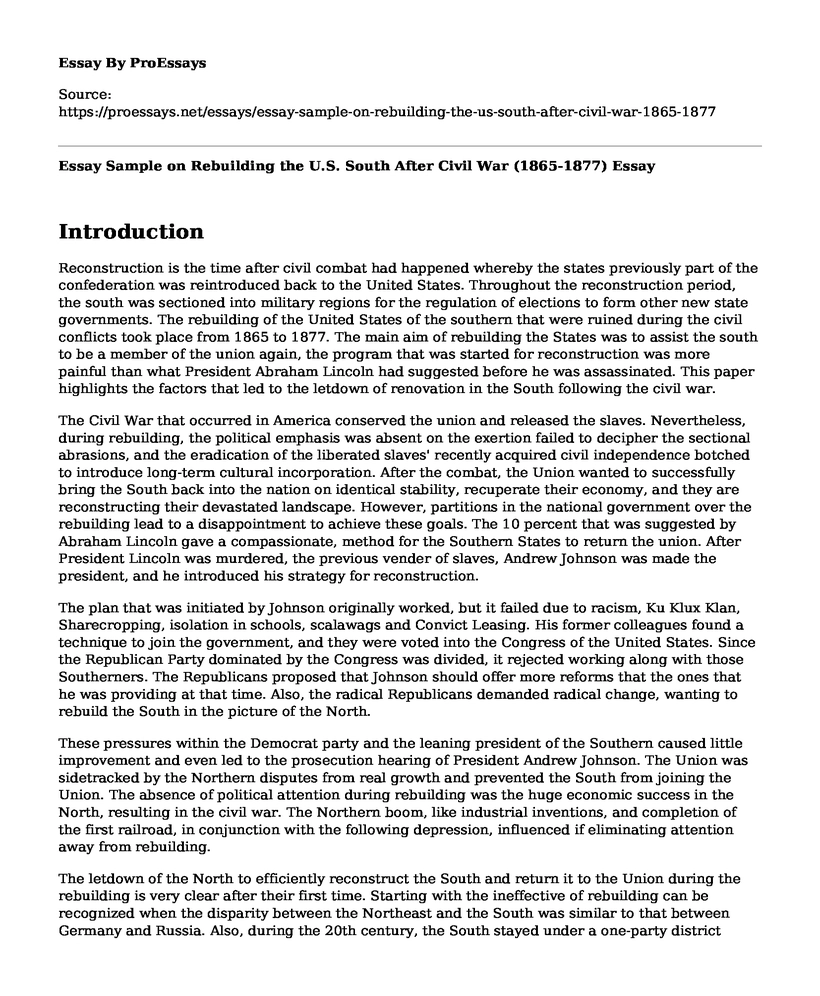Introduction
Reconstruction is the time after civil combat had happened whereby the states previously part of the confederation was reintroduced back to the United States. Throughout the reconstruction period, the south was sectioned into military regions for the regulation of elections to form other new state governments. The rebuilding of the United States of the southern that were ruined during the civil conflicts took place from 1865 to 1877. The main aim of rebuilding the States was to assist the south to be a member of the union again, the program that was started for reconstruction was more painful than what President Abraham Lincoln had suggested before he was assassinated. This paper highlights the factors that led to the letdown of renovation in the South following the civil war.
The Civil War that occurred in America conserved the union and released the slaves. Nevertheless, during rebuilding, the political emphasis was absent on the exertion failed to decipher the sectional abrasions, and the eradication of the liberated slaves' recently acquired civil independence botched to introduce long-term cultural incorporation. After the combat, the Union wanted to successfully bring the South back into the nation on identical stability, recuperate their economy, and they are reconstructing their devastated landscape. However, partitions in the national government over the rebuilding lead to a disappointment to achieve these goals. The 10 percent that was suggested by Abraham Lincoln gave a compassionate, method for the Southern States to return the union. After President Lincoln was murdered, the previous vender of slaves, Andrew Johnson was made the president, and he introduced his strategy for reconstruction.
The plan that was initiated by Johnson originally worked, but it failed due to racism, Ku Klux Klan, Sharecropping, isolation in schools, scalawags and Convict Leasing. His former colleagues found a technique to join the government, and they were voted into the Congress of the United States. Since the Republican Party dominated by the Congress was divided, it rejected working along with those Southerners. The Republicans proposed that Johnson should offer more reforms that the ones that he was providing at that time. Also, the radical Republicans demanded radical change, wanting to rebuild the South in the picture of the North.
These pressures within the Democrat party and the leaning president of the Southern caused little improvement and even led to the prosecution hearing of President Andrew Johnson. The Union was sidetracked by the Northern disputes from real growth and prevented the South from joining the Union. The absence of political attention during rebuilding was the huge economic success in the North, resulting in the civil war. The Northern boom, like industrial inventions, and completion of the first railroad, in conjunction with the following depression, influenced if eliminating attention away from rebuilding.
The letdown of the North to efficiently reconstruct the South and return it to the Union during the rebuilding is very clear after their first time. Starting with the ineffective of rebuilding can be recognized when the disparity between the Northeast and the South was similar to that between Germany and Russia. Also, during the 20th century, the South stayed under a one-party district under the administration of an illiberal regulating elite that concealed hatred to the North.
The incorporation of freed slaves into the community was another matter of Reconstruction, and also reveals the unproductive nature of rebuilding. This is because there were many auspicious moments during rebuilding when advancement was prepared for unbound African Americans. For example, the first promise was on the 13th to 15th Changes that guaranteed African Americans definite public rights. Some of the African Americans were nominated to theCongress and worked in the state and local government. There was the creation of supremacy groups of the whites and the Ku Klux Klan who intimidated the African Americans and begun to deny them their civil rights. The rights of the African American were limited with assistance from the court, and they were placed into positions of reminiscent and indebtedness. This caused the African Americans to become almost unguarded, and they were once again forced to work for the whites without their consent. After twelve years, the effort of rebuilding was cut off, and the economy of the south was still left in carcasses, and most population of the South was also left in poverty.
Rebuilding after the political combat was very unsuccessful due to the reasons mentioned above. The North was at likelihoods and sidetracked over how the struggle should be lectured and hence did not successfully reconstruct the South and did not make it rejoin the Union. Even though there is an era where the slaves seemed like they would be equal to whites, this would not become possible because prejudice was still permitted to infuse into the community. For that reason as perceived in the unsuccessful struggles to rejoin the south back to the Union, as same as the North, Rebuilding failed to assimilate the slaves who were freed into the community.
Works Cited
Foner, Eric. A short history of reconstruction. Blackstone Audio, 2017.
Foner, Eric. Reconstruction: America's unfinished revolution, 1863-1877. Harper Collins, 2011.
Randall, James Garfield, and David Donald. The civil war and reconstruction. Pickle Partners Publishing, 2016.
Cite this page
Essay Sample on Rebuilding the U.S. South After Civil War (1865-1877). (2023, Jan 27). Retrieved from https://proessays.net/essays/essay-sample-on-rebuilding-the-us-south-after-civil-war-1865-1877
If you are the original author of this essay and no longer wish to have it published on the ProEssays website, please click below to request its removal:
- War and Oppression During the Battle of Stalingrad
- Levitsky and Way vs. Diamond Debate: Democracy in Recession
- Tracing the Evolution of Art: A Study of Five Art History Movements
- WWII: Leadership Styles of Allied & Axis Powers - Essay Sample
- Essay Example on Comparing WWI & WWII: Causes & Effects on Global History
- Essay Sample on The Abolitionist Movement: Ending Slavery and Fuelling Debate
- Free Essay Sample on Ancient Egypt







